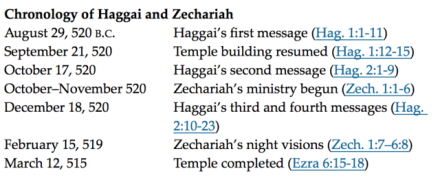 Russian icon of Haggai, 18th century (Iconostasis of Kizhi monastery, Karelia, Russia). Source: Wikipedia.Our Bible study today at church is taken from the Book of Haggai, one of the Minor Prophets. I admit that it's been a while since I have studied Haggai, and one aspect that really intrigued me about the book is all the very specific references to dates. Consider these examples from the HCSB:
Russian icon of Haggai, 18th century (Iconostasis of Kizhi monastery, Karelia, Russia). Source: Wikipedia.Our Bible study today at church is taken from the Book of Haggai, one of the Minor Prophets. I admit that it's been a while since I have studied Haggai, and one aspect that really intrigued me about the book is all the very specific references to dates. Consider these examples from the HCSB:
“In the second year of King Darius, on the first day of the sixth month, the word of the LORD came through Haggai the prophet to Zerubbabel son of Shealtiel, the governor of Judah, and to Joshua son of Jehozadak, the high priest:” (Hag 1:1)
“They began work on the house of Yahweh of Hosts, their God, on the twenty-fourth day of the sixth month, in the second year of King Darius.” (Hag 1:14–15)
“On the twenty-first day of the seventh month, the word of the LORD came through Haggai the prophet:” (Hag 2:1)
“On the twenty-fourth day of the ninth month, in the second year of Darius, the word of the LORD came to Haggai the prophet:” (Hag 2:10)
“Consider carefully from this day forward; from the twenty-fourth day of the ninth month, from the day the foundation of the LORD’s temple was laid; consider it carefully.” (Hag 2:18)
“The word of the LORD came to Haggai a second time on the twenty-fourth day of the month:” (Hag 2:20)
There are similar references to dates elsewhere in the Bible, but I can't think of any other biblical writing that has so many chronological markers in such a short amount of space--two chapters in modern versified editions. This is wonderful for the reader because a very exact chronology of events is fairly easy to trace through the writing. I found a number of commentaries and Bible dictionaries that offered chronologies of Haggai, often including his contemporary, Zechariah, another prophet known for detail in dating events. Here is a representative example:
Screen capture above from Accordance
(E. Ray Clendenen, “Haggai, Book Of.” Holman Illustrated Bible Dictionary.
Nashville, TN: Holman Bible Publishers, 2003, p. 701.).
Although there's some room for error in regard to the years offered above, such attention to detail seems to be more of a modern practice than an ancient one, with most biblical dating references usually focusing on distance from certain events as opposed to the specificity of month and date as offered by Haggai and Zechariah. It's too bad we don't have chronological markers this specific for other portions of the Bible, especially the events in the Pentateuch, Joshua, Judges, and the events of the early monarchy. If the biblical writers had offered a calendar to go along with their narratives, a great number of ongoing debates would be over before they began!
Questions? Thoughts? Comments? Rebuttals? Put them in the comments section!
